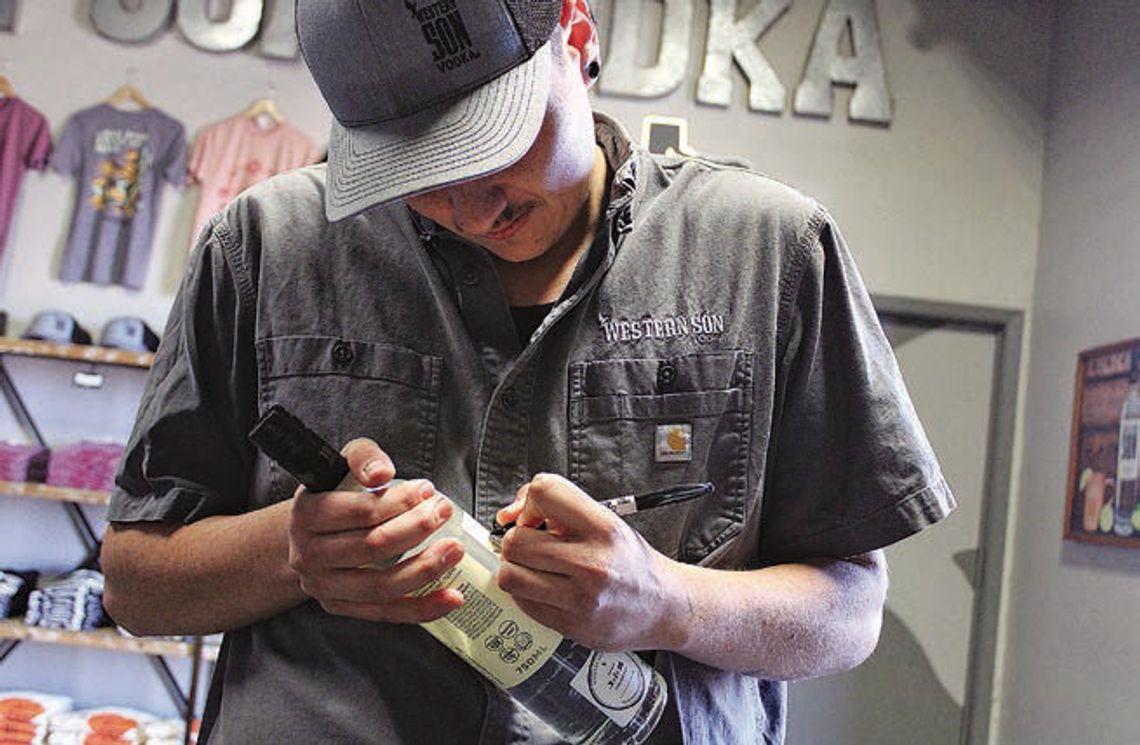Spring in Pilot Point means more than temperate weather, dotted with showers and pollen. It also means a return to events at Western Son Distillery, starting with the annual re-opening, including tours of the facility.
Apprentice distiller Diego Rocha kicked the year’s first tours off on March 1 while vendors and bar staff awaited the arrival of guests.
“Everything I know is home grown knowledge,” Rocha said. “I started for this company in 2020 on our packaging lines. That’s our entry level position. I was over materials as a supervisor for about three years. Then they offered me the spot as a distiller, and at a distillery, you kind of can’t say no to a distiller spot.”
Moving through the company’s 45,000 square foot campus following the vodka on its journey to bottling, Rocha offered a collection of fun facts, regarding the company’s history and its present environment, starting with the juice.
“We don’t want that juice going bad because it’s been sitting there for a couple of weeks, so we’ll even take another precautionary step and take a cap full of 190 proof vodka and pour it in there,” Rocha said.
The first room featured several tanks for holding product, each named after a hero of the Alamo or a local Texas college.
“It’s just one of the cool small things we do around here, kind of our way of paying homage to our state,” Rocha said.
The bottling process demonstrated Western Son’s use of pure juice in their flavored vodka, which the company uses instead of concentrates.
“If you take award-winning vodka and add fruit juice to it, you get more awardwinning vodka,” Rocha said.
The process, both juicing for flavor and mashing corn for booze, produces offal, in the form of crushed fruit and corn slurry, both of which are repurposed one way or another.
“We’ll take them and bag them up in five-gallon bags and give them to our employees,” Rocha said. “When we do that, we have a competition. The competition being go home and make something out of this bag and bring it back. We’ll taste it and rate it for prizes. A lot of people sign up.”
The slurry goes to local farmers to feed livestock.
“The farmers will go and give it to their cows,” Rocha said. “We have a contract with a few local farms. I’ve had a farmer ask how to get on that list. I don’t know— I got told by the boss man that if anyone wants to get on that list, they have to talk to him.”
Moving to packaging, Rocha spoke about the value of automation which, though still manned by human employees, has drastically improved output.
“I got to witness our 50-milliliter line improve our packaging process,” Rocha said. “When I first started, all of our lines looked about the same. There are 60 of those mini bottles in a case, 144 cases on a pallet, so that’s 8,640 bottles they were having to hand grab every day.”
The new poly-pack line groups 10 bottles at a time before they go to a packing specialist.
“Back then they were only able, if they were lucky, to get maybe two pallets a day out,” Rocha. “Now we have six 10 packs going into a case as opposed to 60 singles, increasing our production speed 10 times over.”
He opened and closed the tour with a little of the campus’ history as the old panty factory, culminating in a large pair of ‘granny panties’ donated to the distillery shortly after it opened and signed by many of the previous workers.
“There was some time between when the panty factory shut down and we moved in, and during that time a lot of locals were upset that it was just a big empty factory,” Rocha said. “When we did move in and started working here, providing jobs, some of the local ladies were very happy with us.”
Western Son continues to expand, currently serving 49 states and six countries, the most recent being Japan.
“Anywhere you see Western Son Vodka, no matter where you are in the world, it’s coming from Pilot Point, Texas,” Rocha said.

















